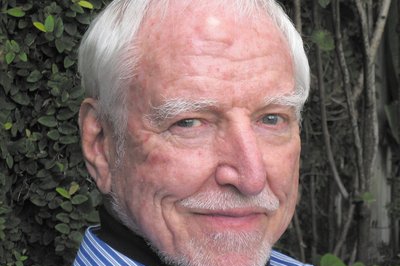Giovanni’s Room this weekend will welcome a man whose career has literally taken him from one side of the world to the other — and whose legacy as the nation’s first openly gay ambassador has made a world of difference for future LGBT leaders.
James Hormel will read selections from his new memoir at an author event from 5:30-7 p.m. Dec. 3 at the store, 345 S. 12th St.
Former President Bill Clinton appointed Hormel as ambassador to Luxembourg in 1999, after a much-publicized struggle with Senate leaders who opposed the appointment of someone openly gay.
During the contentious debate about the merit of the appointment, one senator compared homosexuality to alcoholism and professed that gays were sinners. The Republican-led Senate eventually stalled the vote on his nomination, leading Clinton to utilize his recess-appointment power.
Throughout the arduous process, however, Hormel said he never doubted he would be well-received in Luxembourg.
“I didn’t have one worry for one instant about that,” he said. “That was purely a red herring. [Opponents] were just reacting to something they didn’t want to see happen. They had no idea what people in Luxembourg were thinking but I did because in order to make the nomination, the president was first obliged to go to the government of Luxembourg and say, ‘I intend to appoint this person’ and give them the story on me. Even before the nomination was announced, the Luxembourg government had approved it.”
During his one-year stint as ambassador, Hormel said he received vast support from Luxembourg.
“People were extraordinarily kind,” Hormel said. “They went out of their way to make me feel welcome because I think they knew what I’d been through to get there. And they were already considering domestic-partner provisions in their government at that time, so they were so far ahead of us it was laughable.”
While Hormel’s orientation was a non-issue throughout his work in Luxembourg, it was a struggle that surfaced early on in his personal life.
Hormel, 78, grew up in a wealthy family in the Midwest and spent years trying to assimilate into heterosexual society, marrying and having five children before coming out in the 1960s.
“It was certainly very challenging for anyone in the mid-20th century to come out and there were all kinds of reasons not to,” he said. “Among other things, until 1960 homosexual acts were still criminalized in all 50 states and police were relentless in pursuing individuals. It was terrible. There were a lot of conditions that held people back from being open about themselves, and there were social and cultural attitudes that people still have to confront today. But people need to realize that by hiding who they are, they’re creating a burden for themselves and in coming out you can discover what an enormous relief it is to be able to be yourself.”
Hormel was able to reflect in his own coming-out process in “Fit to Serve: Reflections on a Secret Life, Private Struggle and the Public Battle the First Openly Gay U.S. Ambassador,” released last month.
“It was very mixed,” he said of the personal ups and downs he experienced while writing the book. “There was some nostalgia, some frustration because some things didn’t change as I would have hoped, and there was a great deal of pain around the whole AIDS crisis. I had put a lot of that to the back of my mind so it was painful to remember. I lost a large number of close friends and our constituency lost a large number of potential leaders and, for almost a decade, the government just sat and watched and did nothing.”
The government has made some strides in recent years, Hormel noted, such as with the repeal of “Don’t Ask, Don’t Tell,” the lifting of anti-sodomy laws and the success of marriage equality in several states.
The repeal of the Defense of Marriage Act, however, and the passage of a federal Employment Non-Discrimination Act should be priorities, he said.
“DOMA is patently unconstitutional and it will fall. And ENDA’s been around in some form for 40 years but nobody’s doing anything about it. The federal government’s just been sitting on their hands, not acting to change it,” Hormel said. “Part of that, in my opinion, is that the people who supposedly represent us in Washington don’t actually have the pulse of their constituencies and don’t know what’s going on back home. They need to recognize that demographics have changed, that people’s attitudes have changed. Almost everybody now knows someone who’s gay and people are seeing how ridiculous these attempts to regulate social behavior are.”
One of the key arguments that will advance the LGBT-rights movement, Hormel said, is the acknowledgment that sexual orientation is an innate characteristic.
“It’s not a choice and people need to realize that. We did not choose to put ourselves into a relentlessly heterosexual world to be tormented by them. I didn’t choose to be left-handed, I just am left-handed. As a little boy, people tried to make me write with my right hand and it didn’t work. I see no difference,” he said.
Jen Colletta can be reached at [email protected].
